- Home
- Connie Willis
Blackout Page 13
Blackout Read online
Page 13
But no one was saying, “Where are our guns?” or “Why aren’t we hitting back?” and looking nervously up at the ceiling. They weren’t paying any attention to the thud and crump of the bombs at all. It had apparently only taken the three previous nights for them to completely adapt to the raids. The white-haired woman glanced up, annoyed, at a particularly loud bang, then began counting stitches, and the clergyman returned to discussing next Sunday’s service with a formidable-looking woman with iron-gray hair.
The scrawny, sour-faced woman was still scowling, but Polly had a feeling that was her permanent expression. The aristocratic gentleman was reading the London Times, and the dog had gone to sleep. If not for the occasional muffled explosion overhead and Lila’s talk of dating men in uniform, there’d have been nothing to indicate there was a war on.
And there was nothing to indicate where this was. Since there’d been temporal slippage and the net had sent her through twelve hours later than the target time, it was unlikely there’d been locational slippage as well. There was generally only one or the other. But the bombs were falling too close for this to be Kensington or Marylebone. Polly looked around at the shelter walls for the name or address of the shelter, but the only thing posted was a list of what to do in case of a poison gas attack.
She debated saying she’d got lost in the fog and asking where she was, but given the odd way they’d looked at her when she came in, she decided to listen to their conversations instead and hope they’d let fall some clue, though Lila’s mention of meeting someone hadn’t been any help. She could take the tube to Piccadilly Circus from anywhere, including the East End. And now she was explaining why she only dated soldiers—“It’s my way of doing my bit for the war effort”—and the women on the bench were discussing knitting patterns.
Polly focused on the clergyman, hoping he or the formidable-looking woman—whom he addressed as Mrs. Wyvern—would mention the name of his church, but they were discussing flower arrangements. “I thought lilies might be nice for the altar,” he said.
“No, the altar will be yellow chrysanthemums,” Mrs. Wyvern said, and it was clear who was running things, “and the side chapel bronze dahlias and—”
“Mice!” the littlest girl crowed.
“Yes,” her mother said. “Cinderella’s fairy godmother turned the mice into horses and the pumpkin into a beautiful carriage. ‘You may go to the ball, Cinderella,’ she said. ‘But you must be home by the stroke of midnight.’”
“If that pill of a floorwalker hadn’t made us stay after and do the display windows,” Viv grumbled, “we’d have been able to go to the ball.”
Floorwalker? Display windows? That meant Viv and Lila were shopgirls. But if that was the case Polly had been wrong about what shopgirls in 1940 wore and would have to go back through to Oxford and get a sequined dress before she went to apply for a position.
If she could find the drop again. She had no idea where it was from here.
“It wasn’t only the floorwalker,” Lila said. “It was your insisting we go home and change clothes first.”
“I wanted Donald to see my new dance frock,” Viv protested, and Polly breathed a sigh of relief. Those weren’t their work clothes after all. But it was too bad Viv hadn’t mentioned where they’d gone home to.
It’s got to be Stepney or Whitechapel, Polly thought. The explosions were directly overhead. There was a whoosh and the muffled crump of an explosion very nearby, and then a horrid sound—a cross between a cannon going off in one’s ear and a sledgehammer. “What is that?” Polly said.
“Tavistock Square,” the stout man said calmly.
“No, it isn’t,” the man with the dog corrected him. “It’s Regent’s Park.”
“The anti-aircraft guns,” the clergyman explained, and the white-haired knitter nodded in confirmation.
The anti-aircraft guns? But they hadn’t begun till the eleventh. And supposedly when they had, the contemps had been terrified by the unfamiliar noise and then relieved and overjoyed, shouting, “Hurrah! That’s givin’ it to ’em!” and “At least we’re givin’ a bit of our own back!” But these people hadn’t noticed them any more than they noticed the bombs. The little girls were engrossed in “Cinderella,” and the dog hadn’t even opened his eyes, so this couldn’t be their first night. Which meant the guns had to have started on the eighth or the ninth.
Another gun started up with a deafening, bone-rattling poom-poom-poom. “That’s Tavistock Square,” the dog owner said, and, as another, even louder, joined in, “And that’s ours.”
The stout man nodded agreement. “Kensington Gardens.”
Which meant she was in Kensington, thank goodness, or very near it. But it also meant that just because the raids had been mainly over Stepney and Whitechapel, it didn’t mean Kensington hadn’t been bombed as well. Colin had been right—there were lots of stray bombs. And lots of errors in people’s memories, as witness the date the guns had begun. It had probably seemed like days before the guns had started up to the people in the shelters, even though it had only been a day or two after the Blitz began.
Which is why historians must do on-site research, Polly thought. There were simply too many errors in the historical record. Though she wouldn’t tell Mr. Dunworthy that when she checked in. Or that Kensington had been bombed on the tenth. Or how she’d been out on the streets in the middle of a raid. Actually, she’d better not tell him anything, except what her address was and where she was working.
She wished the newsagent hadn’t shut his door before she had a chance to buy a newspaper so she could check the advertisements for available rooms tonight instead of wasting valuable time tomorrow. With all the restrictions Mr. Dunworthy had put on where she could live, it could take her days to find a room, and she’d already lost one day.
She glanced over at the aristocratic gentleman, but he was still reading his Times. She looked around at the others, wondering if there was a newspaper in the stout man’s coat pocket or tucked into the white-haired woman’s knitting bag, but the only one she could see was the one the dog’s owner had spread out to sit on, and he showed no sign of moving.
None of them did. They were clearly settling in for the night. The white-haired woman was putting away her knitting, the other women had covered themselves with their coats and leaned their heads back against the wall, and the mother had closed the fairy-tale book. “And the prince found Cinderella and took her back to his castle—”
“And they lived happily ever after!” the littlest one burst out, unable to contain herself.
“Yes, they did. Now, time for bed,” she said, and the two older girls curled up on the floor beside their mother, but the littlest one stayed stubbornly upright.
“No! I want to hear another story. The one with the trail of bread crumbs,” which Polly assumed was “Hansel and Gretel.”
“All right, but first you must lie down,” the mother said, and the little girl obediently put her head in her mother’s lap. The stout man next to Polly folded his arms across his chest, closed his eyes, and immediately began to snore, and so did the man with the dog.
I’ll have to wait till morning to look at the rooms to let, Polly thought, but a few minutes later the dog’s owner stood up, bent and patted his dog, and walked over to the far end of the cellar, followed by his dog. He edged past the screen and bookcases and disappeared into the darkness.
He’s going to the loo, Polly thought, got to her feet, and walked over to see if the spread-out newspaper was an old one or today’s. If it was, when he came back, she’d ask him if she could look at the “rooms to let” listings.
“You can’t sit there,” the sour-faced woman who’d shouted at her when she came in called out. “That space is saved.”
“I know,” Polly said. “I only wanted to look at—”
“That newspaper belongs to Mr. Simms.” She heaved herself up and started across the room as if to do battle.
“I’m sorry, I didn’t realize�
�” Polly murmured and retreated to her own space, but the woman wasn’t satisfied.
“Reverend Norris,” she said to the clergyman, “that newspaper belongs to Mr. Simms.”
“I’m certain the young lady didn’t mean any harm, Mrs. Rickett,” he said mildly.
She ignored him. “Mr. Simms,” she called to the dog’s owner as he came back, “someone tried to pinch your newspaper.” She pointed accusingly at Polly. “She walked over, bold as brass, the minute you were gone.”
“I wasn’t trying to steal it,” Polly protested. “I only wanted to look at the rooms to let—”
“Rooms to let?” Mrs. Rickett said sharply, obviously not believing her.
“Yes, I’ve only just arrived in London, and I need to find somewhere to stay,” Polly said, wondering if she should stand up again and go over to Mr. Simms to apologize, but she feared that would only escalate the situation, so she stayed where she was. “I do apologize, Mr. Simms.”
“The newspaper’s to mark my space,” he said.
“Yes, I know,” Polly said, though she hadn’t known, and that was the problem. By walking over to his space she’d apparently broken some rule, and, from the looks everyone was giving her, a crucial one. Mrs. Wyvern and the knitter were both glaring at her. Even the dog looked reproachful.
“Did she do something naughty, Mummy?” the littlest girl asked.
“Shh,” her mother whispered.
“I’m dreadfully sorry,” Polly said. “I promise it won’t happen again,” hoping an abject apology would put an end to it, but it didn’t.
“Mr. Simms has sat in that space every night,” the stout man said.
“Respecting another’s shelter arrangements is vital,” Mrs. Wyvern said to the clergyman. “Don’t you agree, Reverend?”
Help, Polly thought. Colin, you said if I got in trouble, you’d come rescue me. Well, now would be a good time.
“If she wanted a newspaper,” Mrs. Rickett said, “she should have purchased one at a newsagent’s—” and stopped, looking at the aristocratic gentleman. He’d stood up, holding his newspaper, which he’d folded in quarters, and was coming across the room.
He walked straight to Polly and held out his newspaper to her with grave courtesy. “Would you care for my Times, dear child?” he asked her. He spoke quietly—but not so quietly that everyone in the room couldn’t hear him, she noted—and his voice was as refined as his appearance.
“I—” Polly said.
“I’m quite finished with it.” He held it out.
“Thank you,” she said gratefully, and the incident was over. Mrs. Rickett retreated sullenly to the bench, the white-haired woman took out her knitting again and began counting rows, the rector went back to his book, and Lila whispered, “Don’t pay Mrs. Rickett any mind. She’s an old cat,” and went back to talking about the dance she and Viv were missing.
The gentleman had managed to completely defuse the situation, though Polly wasn’t certain how. She shot him a grateful look, but he’d retreated to his corner again and was reading a book. She looked down at the newspaper in her hand. He’d folded it open to the “Rooms to Let” section for her. She started through the listings, looking for permissible addresses. Mayfair. No, too expensive. Stepney, no. Shoreditch, no. Croydon, no, definitely not.
Here was one. Kensington. Ashbury Lane, which might work. What was the address? Please not six, nineteen, or twenty-one, she said silently. Eleven. Excellent—an allowed address, within her budget, and near Oxford Street. Now if it was only near a tube stop. “Convenient to Marble Arch,” the advertisement read. Which had taken a direct hit on September seventeenth.
She mentally crossed it off and continued down the list. Kensal Green. No, too far out. Whitechapel, no.
“The raid seems to be letting up,” Lila said.
The racket did seem to be diminishing. The explosions sounded farther off, and one of the guns had stopped firing. “Perhaps the all clear will go early tonight, Viv,” Lila said, “and we can still go to the dance,” but the moment she spoke, the barrage started up again.
“I hate Hitler,” Viv burst out. “It’s so utterly unfair, being trapped in this place on a Saturday night.”
Polly looked up sharply. Saturday? It’s Tuesday. But even as she thought it, she was seeing the evidence that had been in front of her all along—the dance Lila and Viv had been planning to go to, the guns that hadn’t started till Wednesday and that no one had remarked on, the braced ceiling, the Snakes and Ladders game, the embroidered tea cloth—all signs they’d been coming here for more than three days. The clergyman and the woman’s discussion of the order of service for Sunday. For tomorrow.
She’d misread all the clues, just as she had on the street when she’d thought it was early morning. The guns hadn’t started till the eleventh, after all, and of course the raids had sounded like they were overhead. Kensington had been bombed on Saturday. But if it’s Saturday, she thought, I’ve already missed four days. And the crucial first few days of the Blitz when the contemps were adjusting to it. That’s why they were all so calm, so settled in. They’d already adjusted.
And I missed it, she thought furiously. Badri said he expected two hours of slippage, not four and a half days. And it was actually even more than that. Tomorrow was Sunday. She wouldn’t be able to look for work till Monday.
Which means I can’t start work till Tuesday, by which time I’ll have lost an entire week of observing shopgirls, and I only have six.
It can’t be the fourteenth, she thought. She snatched up the newspaper and paged through it, looking for the front page. I didn’t have enough time to begin with.
But it was. “Saturday, 14 September 1940,” the masthead read, and below it, appropriately enough, “Late Edition.”
For want of a nail, the shoe was lost. For want of a shoe, the horse was lost. For want of a horse, the rider was lost. For want of a rider, the kingdom was lost.
—PROVERB
Saltram-on-Sea—29 May 1940
IT WASN’T REALLY A FOOT OF WATER. IT WAS ONLY ABOUT four inches, but it covered the hold. Mike could see why the Commander had asked him if he could swim.
“Nothing to worry about,” the Commander said, seeing Mike’s reaction. “Just need to get the bilge pump started.” He splashed unconcernedly through the water and lifted a trapdoor. “She’s been sitting here all winter. An hour or two out in the Channel, and she’ll be as good as new.”
An hour or two out in the Channel, and she’ll be at the bottom of it, Mike thought. And she won’t need a U-boat to do it. He looked around the hold. There was a tiny galley with a Primus stove against one wall and a scarred wooden table against the other. On it were a messy heap of maps and charts, a half-empty bottle of Scotch, a flashlight, several large cork floats, and an opened can of either sardines or bait. Against the other wall were two lockers and a bunk with a tumble of gray blankets.
The Commander got down on his knees and reached down through the trap. The bilge pump coughed and then died.
There is no way I am going anywhere on this, Mike thought, even to Dover. I’ll just have to find another boat. But the men on the dock hadn’t exactly been full of suggestions. Let’s hope Powney’s driving into town right now.
Commander Harold did something else to the bilge pump, and this time it chugged for a full minute before dying. “Needs a bit of oil is all,” he said. He splashed over to the galley, lit a fire under a coffeepot, and began rummaging through the pile of charts. “The Navy’s gone soft, that’s what’s wrong with it.” He unearthed an opened can of potatoes and then a doubtful-looking mug. “You know what they feed ’em on board ship nowadays? Tea with milk and sugar! You wouldn’t see Nelson drinking tea! Rum, that’s what we drank, and hot coffee!” He poured a cup and handed it to Mike. Mike took a cautious sip. It tasted like it looked.
“You should see what they sent—now, where did I put it?” the Commander said, attacking the mess on the table again. “I know it’
s here somewhere—aha!” He fished a letter out of the heap and handed it to Mike with a triumphant flourish. “The Small Vessels Pool sent that letter four weeks ago.”
The Small Vessels Pool. That was the “Smale Vises School” Mr. Tompkins had been mumbling about. And this was the letter they’d sent out at the beginning of May asking small craft owners if they’d be willing to volunteer their boats for service in case of invasion or other “military emergency.”
“Sent one of their bloody forms along with it,” the Commander said. “Six pages long! I wrote ’em back the very same day, volunteering the Lady Jane and me for service.”
I’ll bet you didn’t tell them about the broken bilge pump, Mike thought, or the four inches of water in the hold.
“And haven’t heard a word since,” the Commander was saying. “Four weeks! It took Hitler less than half that to take over Poland! If they’re running the war in France the way they’re running the Small Vessels Pool, they’ll be surrendering to Hitler a fortnight from now!”
No, they wouldn’t, thanks to a ragtag armada of motor launches and fishing smacks and pleasure boats who’d arrived to rescue them in the nick of time. But the Lady Jane wouldn’t be among them. It would never make it out of the harbor, let alone across the Channel and back. And there was no way he was going to let the Commander take him up to Dover in it. Which meant he’d better get back to the Crown and Anchor so he wouldn’t miss Mr. Powney. “I’ve got to be going,” he said. “Thanks for the coffee,” and tried to hand the mug back to the Commander.
“You can’t go till you’ve seen the Lady Jane. This is her engine.” The Commander lifted another trapdoor to reveal an ancient-looking motor, black with grease. “You won’t find an engine like that nowadays.”

 Passage
Passage Bellwether
Bellwether Blackout
Blackout Doomsday Book
Doomsday Book A Lot Like Christmas: Stories
A Lot Like Christmas: Stories Water Witch
Water Witch To Say Nothing of the Dog
To Say Nothing of the Dog Fire Watch
Fire Watch The Winds of Marble Arch and Other Stories
The Winds of Marble Arch and Other Stories Uncharted Territory
Uncharted Territory All Clear
All Clear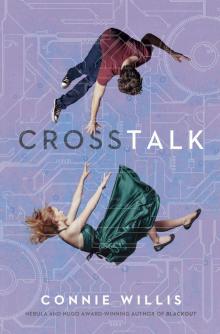 Crosstalk
Crosstalk Lincoln's Dreams
Lincoln's Dreams Miracle and Other Christmas Stories
Miracle and Other Christmas Stories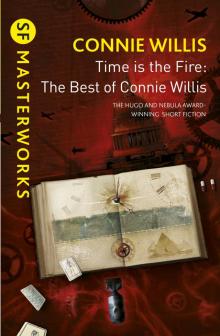 Time is the Fire
Time is the Fire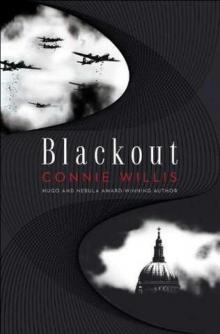 Blackout ac-1
Blackout ac-1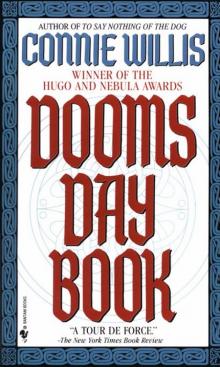 Dooms Day Book
Dooms Day Book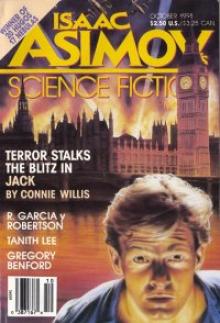 Jack
Jack The Doomsday Book
The Doomsday Book Terra Incognita
Terra Incognita The Best of Connie Willis
The Best of Connie Willis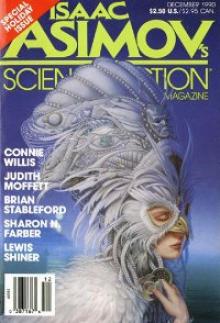 Cibola
Cibola Schwarzschild Radius
Schwarzschild Radius Even the Queen
Even the Queen The Last of the Winnebagos
The Last of the Winnebagos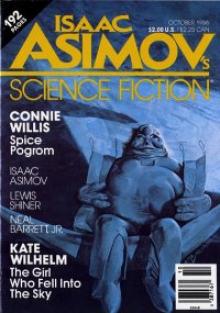 Spice Pogrom
Spice Pogrom Oxford Time Travel 1 - Blackout
Oxford Time Travel 1 - Blackout At The Rialto
At The Rialto A Lot Like Christmas
A Lot Like Christmas